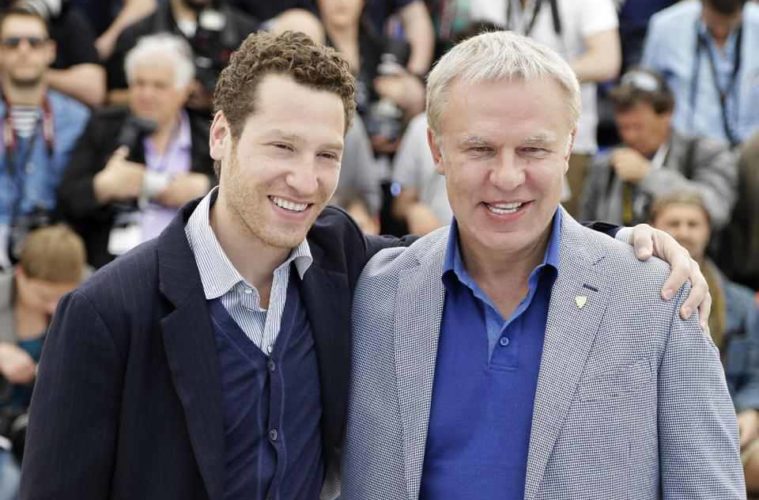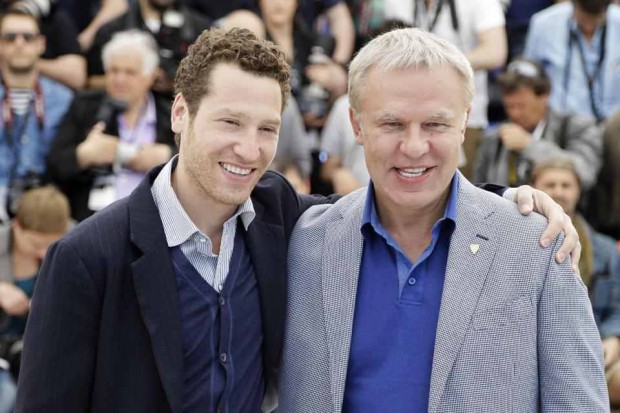
One of the most accomplished documentaries amongst the Cannes Film Festival line-up this year Red Army, which was produced by Werner Herzog and recently acquired by Sony Pictures Classics. Director Gabe Polsky takes us a captivating adventure to tell the story behind the legendary ice hockey team and their unbeatable streak. The film shows how Soviet Union used sport as a tool for propaganda, particularly when it comes to this team and their success being proof of Russian power over the West.
However, this is not solely about propaganda, as a unique story unfolds about Russia and their people. As one of the main subjects of the film, Viacheslav Fetisov, said during the screening, this is a film about one Russian kid who dreamed to play for a national team and that the world would be friendly. I was lucky enough to sit down and have conversation with Russian, American-born director Gabe Polsky and main focus of the film, former Red Army player Viacheslav Fetisov, to discuss about their passion for hockey, what it is all about and the film’s production and post-production processes. Check out both full conversations below:
The Film Stage: Why did you take this project? I heard that your parents from Ukraine.
Gabe Polsky: Yeah. My parents are from former Soviet Union and I played hockey very competitively growing up. I played in Yale University Division 1, high-level hockey. And, basically, growing up I was kind of, sort of trying to assimilate to American culture. I didn’t want to talk Russian in public.
So, do you speak Russian?
Polsky: Yeah, but I was embarrassed. People really didn’t know that I was Russian.
Why not?
Polsky: I don’t know. As a kid, you’re kind of insecure. But I don’t know, I was just embarrassed by it. Anyways, I was introduced to Soviet-style hockey.
Did your parents introduce it?
Polsky: No. I had one of the first Soviet Union coaches in the U.S. I was completely inspired by creativity. He really encouraged creativity in sports and interesting, unusual training that they weren’t doing in the U.S. And I was very inspired and I watched Soviet hockey on a VHS tape and I was completely mind-blown.
Where did you get those VHS tapes?
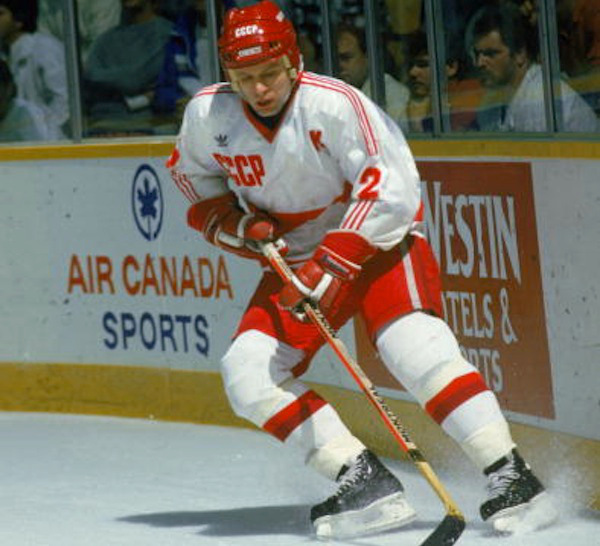 Polsky: I found it somewhere, you know. I was interested. I did a little research and somehow I found out. And I just couldn’t believe that people could play hockey like that and felt it that it was the whole another level of sport. And I started getting curious about it more and more so. And I wanted to know how they were so good. How? When did this happen? What’s behind this? And I started to learn and do my research. And realized that the story is very deep and profound.
Polsky: I found it somewhere, you know. I was interested. I did a little research and somehow I found out. And I just couldn’t believe that people could play hockey like that and felt it that it was the whole another level of sport. And I started getting curious about it more and more so. And I wanted to know how they were so good. How? When did this happen? What’s behind this? And I started to learn and do my research. And realized that the story is very deep and profound.
When did you find out about Viacheslav?
Polsky: I was trying to get in touch with him. He wasn’t responding.
Did you tried to get in touch with him before beginning the project?
Polsky: No, no, no. I was already interviewing people and we were trying to get in touch with him and somebody got in touch with him. He was sort of hard to reach and finally he agreed to do the interview and I think he was giving me about fifteen minutes — very short — and he was cynical about what I was trying to do because he didn’t know what I wanted to do. And he sort of realized that I was going to do something unusual, different that you would see. He knew that I had some understanding of the culture and hockey. He started to be comfortable and the interview lasted awhile. It just started from there. He was trying to intimidate me and challenge me.
Did Viacheslav have any questions about the project during interview?
Polsky: Yeah. He was questioning if I was going to do something that made Russians look bad again. He was just tired of this cliché story about Russia.
Did you want to make a film about hockey or more about his personality?
Polsky: No. I wanted to make a story about the Soviet Union and sort of the story of Soviet Union, but told through hockey, through him. They are representative of what was going on in Soviet Union and its people. Their story is the story of the people, of the Russian soul.
What was first reaction of his when he found out that you wanted to make a film about him?
Polsky: He just was skeptical about it.
At what point Viacheslov agreed to join a project?
Polsky: During the interview. I had started to interview him and he agreed to do an interview but he didn’t known how long or whatever. He was controlling everything.
Your conversations and interviews in the actual film are very natural, even those little things like the scene with little girl with KGB agent. I was wondering is any of it where scripted or rehearsed?
Polsky: No, that girl came in. She is a random girl. It wasn’t even his granddaughter, she just intercepted the interview.
And what about Viacheslov?
Polsky: Did he script anything? Nothing, nothing. He would never let me. He’d just say, “F*ck you.”
Even when he shows his finger to the audience?
Polsky: Yeah, yeah. He is very straightforward.
Can you tell more about the production and post-production process? How long did it take the movie?
Polsky: Two years. From beginning to done, to finish, to now.
How about funding?
Polsky: Documentary is difficult. Nobody wanted to finance it, nobody.
Why is that?
Polsky: Because they are stupid and they don’t believe in me.
They don’t believe in you?
Polsky: Well, not enough.
Because you are young…
Polsky: Yeah, young. There is only a few companies that even make documentaries in the U.S., especially sports related. I went to them and they said no. I had to find private money and I had to use some of my own.
How did the post-production process go?
Polsky: It was difficult. It was very difficult. The most difficult thing maybe I’ve done in film. It was grueling and endless, but I was emotionally intact and mentally having patience to keep continuing to make it better until I was satisfied.
Can you tell a little bit about Werner Herzog? I know that you had some experience working with him before with Bad Lieutenant.
Polsky: Yeah, Bad Lieutenant. I produced Bad Lieutenant.
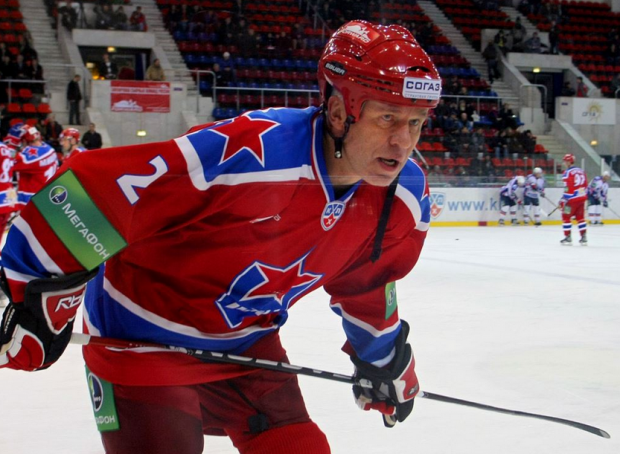 How did you meet?
How did you meet?
Polsky: I produced Bad Lieutenant and got him involved. He directed it and I produced it. So we worked together. It was funny, he was the director of Bad Lieutenant but he taught me, just me watching him.
So you learned…
Polsky: …how to make a movie.
That’s the best experience ever.
Polsky: Yeah.
I love him. As a director, he is amazing.
Polsky: He’s amazing because he really gets at the soul of human being and that’s what I’m trying to do.
How did you get him on board this time?
Polsky: I showed him my work because he’s got very interesting point of view. So I was interested to hear what he says and get his advice. So I showed it to him later and he said that, “I think this is very deep movie, very profound.” And he said, “I’ll do it. I would love to help. Let me know if you need any help with anything because I really love this and I support this, support your work.” So I said, “Can I put your name on?,” and he said a couple things what would help.
Do you still keep in touch and plan to work with him in the future?
Polsky: Yeah. I hope I always have a relationship with him. I am very thankful for his inspiration. Yeah, I hope that I will continue.
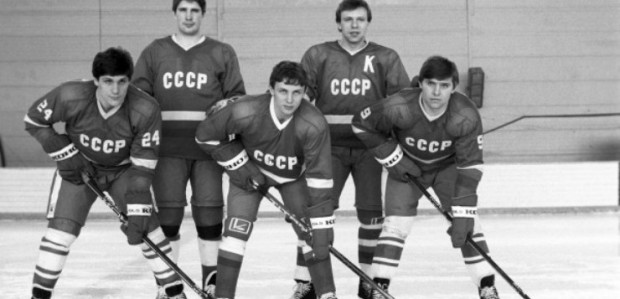
I really loved the film. It’s very deep and touching. How do you feel about it?
Fetisov: I never liked to see myself. Even when I played a game, I watched the video let’s say one hour after the game, and I was pretty critical about myself.
Why is that? You were unsatisfied about the game or just in general?
Fetisov: In general. But it’s his [Gabe Polsky’s] movie. People liked it and I saw almost everybody was standing at the end [of the screening]. People applauded.
So are you proud of it?
Fetisov: I’m proud for Gabe. He’s done a good job. People liked it and it is his story. I talked to him in front of the camera over for 20 hours about different things, about the situation of my life and he picked some of them and put on the film. And it is his story.
So you don’t feel that film is about you? Yesterday, before the screening, you said that it’s not about you, but a kid who had dream and a story.
Fetisov: It could be an Estonian kid, could be American, from all parts of the society, all kind of successes in the world, to get good family support, to get a good system to be successful. Of course, it is about all kind of successes of human beings. In my situation and also in some political things that I was involved, I was up against the Soviet system and for my rights, I get to go to the United States as the first official Soviet citizen. They also open a gate for Estonians that lived in the same country; every Estonian after me can go and work out of the country.
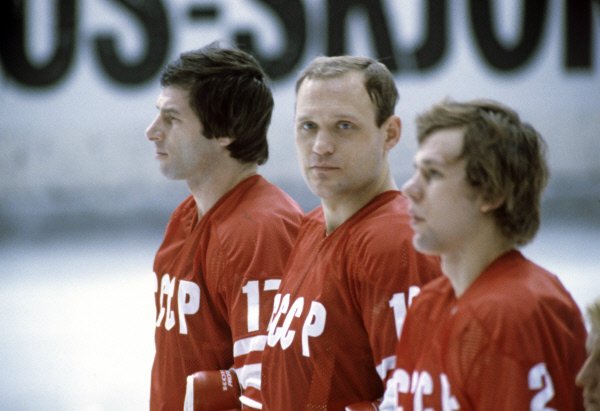
What year was that exactly? 1989?
Fetisov: Yeah, in 1989.
Yeah. That’s right. It was the same in my country, Lithuania. We were in the Soviet Union. Just after that our basketball players could go and play in the NBA.
Fetisov: Yeah.. Arvydas…
Yes, Arvydas Sabonis. He went to play to NBA in 1995, I guess.
Fetisov: Yeah, a couple years after me. Yeah.
The first one was Sarunas Marciulionis, who was able to go the same year as you, in 1989. However, let’s get back to the film. When Gabe contacted you, asked you to do an interview with you, what was your reaction? Did you want him to make a movie about it or you really were skeptical about everything?
Fetisov: I’ve got so much stuff about me. It’s everywhere. I read three books. In Russia they’re shooting a fiction film right now about my life story. It’s going to be on Channel 1 at the end of this year. My life is public for many years and people want to know everything about my life and sometimes I agree with the system, sometimes I don’t. But for me, it’s another story. When he called me and asked me to be part of his film, I asked him what kind of format. And he said it is going be about ten Soviet hockey players and they are telling their life stories. I said, “Gabe, it’s not my format. I cannot tell my story in three-to-four minutes, and you can do it without me.” And I said, “No.” But he tried hard, talked to another players, got the OK from them. He flew to Moscow, interviewed the guys and one day called me and he said, “I am here. I brought the crew, lots of people and I want to spend a few minutes with you.” I was in a good mood and I said, “OK, I’ll come.” I saw the kid for the first time, he was pretty much ready to tell my story, you can feel it. We talked about it in front of the camera for about six hours straight.
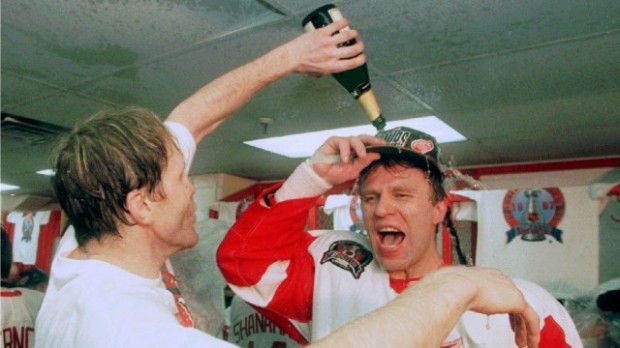
Just talked about everything…
Fetisov: Just talked about politics, hockey. That how we started and then we flew to New Jersey, to my home. Then we took another five to six hours and the he sent me the footage which was supposed to be a movie, a film. I looked at it and I said, “No way. No way I am going to let you show this one.” And he was so disappointed. He said, “What can I do?” I said, “You think what you can do.” And he flew one more time to Russia.
You were disapproving of the plot or your words, or how he represented you?
Fetisov:He put my story before everybody. I said that, “You can make the hero somebody else and put me at the short end of things.”
But at the end the protagonist of the film is you. How did you agreed to it?
Fetisov:It’s his story. I accepted it. He said that he needs me. My family saw the movie, they showed to the friends and people said “We like it.” A very unique American kid made a movie about the Soviet-born hockey player and it’s a different angle of the story, different thinking of how they put together. And I said, “OK.”
Gabe mentioned that you were afraid how you will represent Russia.
Fetisov: I am not afraid of this at all. This is his story.
He represented some thing, I wouldn’t say in the bad way, but definitely not from optimistic point of view. How do you feel about it?
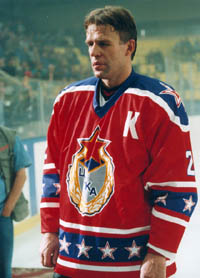 Fetisov: I knew what I said, what he asked me. You know, I am not afraid to say something what I don’t like. We’ve been talking for those 20 hours, I didn’t see anything that could be a damage to my country’s reputation. And I wasn’t even afraid of what’s going to happen, but at the same time I say some things. But once again, it’s not my problem.
Fetisov: I knew what I said, what he asked me. You know, I am not afraid to say something what I don’t like. We’ve been talking for those 20 hours, I didn’t see anything that could be a damage to my country’s reputation. And I wasn’t even afraid of what’s going to happen, but at the same time I say some things. But once again, it’s not my problem.
The film has lots of old video footage from your childhood when you are playing hockey or at family gatherings. Is it from your personal archives?
Fetisov: No, no. He found it somewhere else. Even for me it was a surprise. In some footage it’s me very young, sometimes a little kid. Some of it I’d never seen before.
You’ve never even seen some of it?
Fetisov: Yeah, it is big tribute to me. They did good job by finding all these archived footages from some different sources. Very unique.
You were touched by it ?
Fetisov: Oh, yeah. I gave him a high-five.
The footage, for example, shows you leaving Russia and saying goodbye to your family. It’s just priceless.You actually had an opportunity to play in Soviet Union and in America. The film represents that no matter how rigid it was or how much it was about propaganda during SSRs times, it was a strategy of teamwork, which was brought up by Russian culture, and it was actually the key to good hockey and it worked.
Fetisov: I am telling one thing. Politics can be gained from any aspect of the people’s life, whatever they need. I played professional hockey 23 years in the Soviet Union and the United States. The best time in my life was when I’ve been a hockey player. And even better part of my life is when we were five Russian kids and I became the captain of the Soviet Russian team. I was 24 years old and then we became the number one in hockey. This kind of responsibility, this kind of chance we got, we feel that we could do it only to be together — to think the same way, to try a lot, to have the highest possible goal, and we achieved it. We had lots of fun. We brought the game in a different way. We showed to the world how to play it differently, play for each other. And people liked it, not only in the Soviet Union, in Europe, in North America. The give us ovations every single time.
Do you think that these days there is still the same spirit of collectiveness and teamwork?
Fetisov: I play and coach in North America. I am going to tell you exactly the same philosophy. If you’re not playing for a team right now, you are not the best player. If you think you are bigger than a team, you’re not going to be successful. The philosophy is changing if we want to be successful as a team in any business. In any sport you have to think collectively, you have to be together, you have to support each other. Otherwise, if another team are going to think like this, they are going to beat you.
Red Army premiered at Cannes Film Festival and will be released by Sony Pictures Classics.

